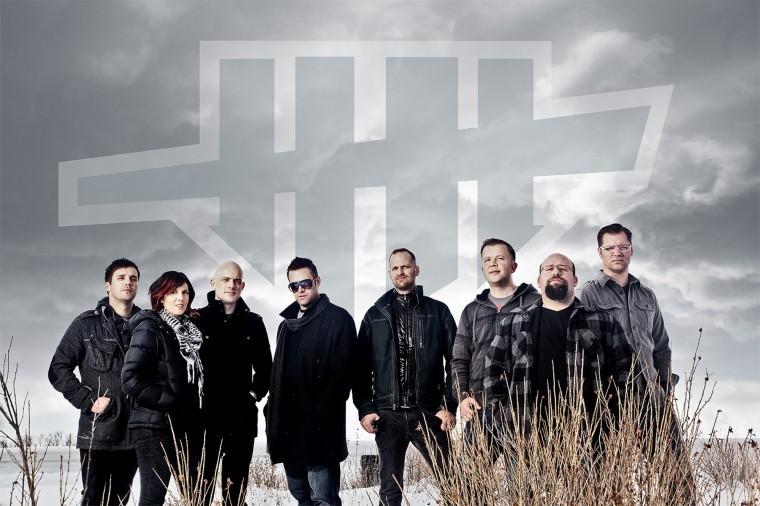Five Iron Frenzy comes out of retirement, breaks Kickstarter record
March 19, 2012
There isn’t a way to say this without sounding melodramatic and eliciting eye-rolls, but I am one of those people who can honestly say, “that song changed my life.”
“World Without End” by Five Iron Frenzy introduced a 14-year-old frizzy haired, brace-faced, oboe-playing band nerd version of myself onto ska music, led to spiritual exploration and most importantly, made me want to learn to play trombone. Playing trombone has helped me pay for college, allowed me to travel the country, make friends and make me feel like I might be kind of cool in a way the oboe never could. Like many teenagers growing into adulthood, my beliefs have changed, and I have grown out of the music I used listened to, but I have always found solid ground with Five Iron Frenzy.
Five Iron Frenzy describes itself as an undead band. The eight-piece powerhouse formed in 1995 in Denver, Colo. announced its return to tremendous fanfare on Nov. 22 after breaking up and playing its last show exactly eight years prior.
Five Iron Frenzy is only one of the “Big Three” Christian ska bands to stage a comeback recently. The Insyderz and The O.C. Supertones are playing festivals and recording new music also.
FIF was basically forced out of retirement by shoddy journalism.
“At Cornerstone [Festival] last year, I was talking to someone about Five Iron Frenzy,” said saxophonist Leanor “Jeff the Girl” Till. “He asked if we would ever play again, and I told him we hadn’t really talked about it, but that I would love to.”
That conversation led to an article being posted online claiming that Till, whose nickname stems from her being the only woman in FIF and one of the few in the entire ska/punk scene, had confirmed the band would play Cornerstone 2012. Suddenly, Till was bombarded with emails and phone calls. “I had guys in the band calling me up, like, ‘what did you say?’”
The mix-up led to talk among the members of the band and in the end, they decided to get back together and record a new album.
Before Nov. 22, FIF kept a tight lid on the project.
“I hung out with Switchfoot the week before, and I couldn’t tell them, because I was afraid they will spill the beans,” Till said. “I couldn’t even tell my dad, because he can’t keep a secret!”
FIF secretly went to New York City to record a song and release it for free on Nov. 22, known as Five Iron Frenzy Day, as proof to the fans that they were serious about reuniting. The announcement shut down their website and broke a record on Kickstarter, a website where donors can give money to creative projects for incentives, or rewards, as determined by the party who creates the project.
Within 55 minutes, the $30,000 they had asked for had been funded.
“I was an emotional, crying, laughing wreck all that day,” Till said. “I was very touched.”
By the end of the Kickstarter campaign on Jan. 21, fans had donated $207,980, making theirs the most funded music campaign in Kickstarter history.
I am aware of the tendency of people to switch off and become immediately disinterested when they hear the term “Christian band.” What makes Five Iron Frenzy exceptional is that while faith is evident in some songs, its material covers everything: Native American and women’s rights, consumerism, tongue in cheek love songs, Tom Jones and ABBA covers, songs about mullets and mayonnaise tacos and issues within the ska/punk scene and the music industry.
“I actually didn’t know they were Christian for a long time,” said Zach Smith, senior music education major. “They get away with it because they’re not like, ‘Ahhh Jesus!’ It’s there, but I don’t care, because it’s good music.”
A question raised in the midst of all the reunion fervor is whether ska still has a place in the American music scene.
“I’m sure the newish revival will still have the same feeling of ska but it wont be the same as it used to,” said A.J. Stevens, junior business administration major. “I think they’ll change somewhat to appeal to new audiences. One of my favorite bands is Mustard Plug and they’re in their 40s with kids and families and they’re still touring.”
When talking to Till, I realized how thankful and fortified by her band mates and fans she is. When I stammered out a quick story of how her music ‘like, totally changed my life’ at the end of the interview, she seemed genuinely interested and pleased in what I had to say.
“Music is transformative and important,” said Till. “We present people with a new way of looking at life and new energy and passion and I hope that they are encouraged. We aim to keep our promise to above and beyond entertain our butts off. I feel very empowered, passionate, blessed and unstoppable.”



